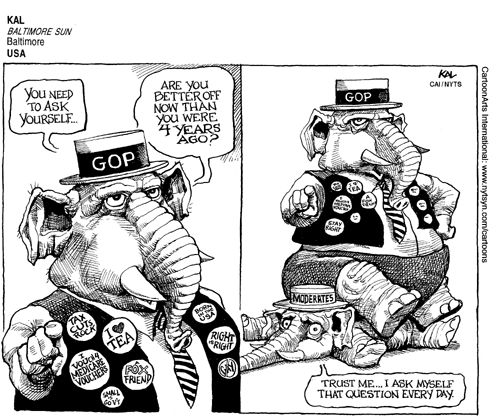In New York magazine, liberal Frank Rich reports on his experiment of immersing himself, “listening to, watching, reading, surfing, and otherwise gorging on conservative media” during the week of the Republican national convention. His conclusions do not paint a pretty picture for the future of the Republican party. My favorite quote:
What did I learn in my week imbibing the current installment of the Reagan revolution? I came away with empathy for those in the right’s base, who are often sold out by the GOP Establishment, and admiration for a number of writers, particularly the youngish conservative commentators at sites like the American Conservative and National Review Online whose writing is as sharp as any on the left (and sometimes as unforgiving of Republican follies) but who are mostly unknown beyond their own ideological circles. What many of the right’s foot soldiers and pundits have in common is their keen awareness that they got a bum deal in Tampa, a convention that didn’t much represent either their fiercely held ideology or their contempt for the incumbent. They know, too, that their presidential candidate is the Republican counterpart to Al Gore—not only in robotic personality but in his cautious hesitance to give full voice to the message of his troops. Even Paul Ryan, the right’s No. 1 living hero, let many of his fans down with his convention speech—not because he fudged facts but because he soft-pedaled his “big ideas” about small government once in the national spotlight. Ryan left some conservatives wondering if the only thing they gained from having him on the ticket was his name on a lousy T-shirt.
The Republican establishment tightly controlled the convention, leaving the Tea party and other small government true believers out in the cold. And while the mainstream media mainly showed that version of the convention, the new Republicans had their say on the other media to which Rich spent the week listening. It is an interesting war between the old and new guards.
Personally, I think both sides have lost their way and are in danger of becoming irrelevant in this world of changing times and demographics. Both Republican factions are clinging to a world that, if it ever actually existed, certainly doesn’t exist now — the mythical world of Saint Ronnie where you never raise taxes on the rich and the enemy are labor unions and the welfare-sucking poor.
Rich reaches this conclusion:
Since Eastwood’s turn was perhaps the most replayed video of the entire convention, it may have done damage to the convention’s “more in sorrow than anger” political strategy—assuming that strategy was sound. On November 6, we’ll learn if the party Establishment and Romney campaign knew what they were doing by striking that pacifist tone, or whether the angry voices on the right who opposed them can say, “I told you so.” We’ll learn as well whether the Republican Party is on a path to revive the Reagan revolution or, as the blogger Doug Mataconis has it at Outside the Beltway, in a self-destructive tailspin mirroring that of “the Democratic Party in the wake of the Vietnam War.” Either way, I finished the week with sympathy for true believers on the right who are far more divorced from their own political party and the nation’s culture than even those on the left who are perennially disillusioned by Obama, the Democratic hierarchy, and their own journalistic Establishment. That anger is certain to rage long past Election Day, and if I learned anything in my week strolling around the conservative mind, it was that anyone who sticks to an exclusive diet of lamestream media is missing the news.


